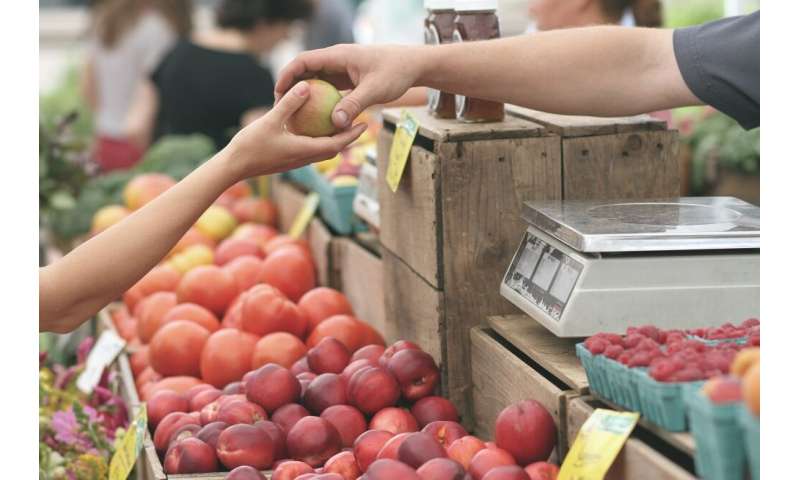Short food supply chains: setting another place at the table

Ever more citizens are opting for short food supply network to get fresh local produce. They bypass supermarkets and support sustainable agriculture. However, this is often the prerogative of an educated and activist population. The challenge is to involve more disadvantaged people
There is an old tradition in many cafés in Naples, Italy: it's called "caffè sospeso", in Italian "pending coffee". People may decide to pay in advance for a second coffee to be offered a person in need.
Now, this habit has been borrowed by a short food supply chain group in Paris, France. The "panier suspendu", in French "pending basket" is an initiative by a citizen association called Coopaparis. Since 2014, around 450 families have joined it to get local and good quality products at reasonable prices, while supporting sustainable agriculture. All the members are volunteers. The association, which has a shop in the Goutte d'Or neighbourhood, asks them at least five times a year to help in its delivery activities.
Paul Mazerand, one of the members, explains: "Our initiative was born in a peripheral area. So we do care about allowing access to people on low budgets. For example, we have a five-euro solidarity card, instead of the usual membership card of 30 euros, granted on the basis of a self-declaration. And we also have some 'pending products' that are offered for free. They are paid on a voluntary basis by other members or by the association itself."
He adds: "One of our core values is solidarity: solidarity among members and towards farmers. By reducing the number of intermediaries, the producers—of which there are now more than 50—can be better remunerated. There are minimal or no negotiations with them, they decide the prices, and then the association gets a 10% margin on the products on sale."
One of the first short food supply chain groups run by citizens in Paris is Consom'Solidaire, which was created in 2005 and now has over 200 members. It is part of the area Île-de-France AMAP network. AMAP stands for "association pour le maintien d'une agriculture paysanne", in French "association for the preservation of smallholdings". Consumers contract into the harvest of one or a few local producers, allowing them to share the risks of farming. Then citizens receive their food baskets, usually once a week.
Joanna Wong, an artist based in Paris, joined Consom'Solidaire six years ago. She says: "I think that in France, when they started with the AMAP concept, they took inspiration from the Japanese 'teikei' system, where people in the late 1960s just got together to buy directly from farmers and cut out supermarkets."
"We are all volunteers. Every member takes care of a product, keeps in touch with the producer, collects all the orders by email and organises the delivery. Most of the products are paid for in advance. For vegetables, we may agree supply deals for six or twelve months. We also have solidarity initiatives. For example, our beekeeper once lost his insects in a flood, so we decided to pay for his honey in advance and receive it the following year. This allowed him to finance and restart his production."
"Membership is between 10 and 16 euros per year. And we have around 15 'paniers solidaires' for people on low budgets, where half of the price is paid by the association," she concludes.
More and more short supply chains are being run by consumers themselves. Expert Yuna Chiffoleau, from the French National Institute for Agricultural Research (INRA) in Paris, explains: "There is a new trend corresponding to stronger engagement by citizens, who not only look for fresh and good quality products, but also want to manage the process. There are several formats: cooperative supermarkets, small purchasing groups, bigger associations of 300-400 members with or without a shop, to mention some of them. Members may be volunteers or employees."
But she adds: "Unfortunately, in France as in many other countries, short food supply chain organisations are not often diverse in terms of income and education level. Although some groups try to expand their public, for example by organising training events, tastings, meetings, offering free products for people who have fewer financial resources, social mixing in short food supply chains remains a challenge."
According to Chiffoleau, the problem is not only economic but also cultural. Members may not be on high incomes, but often have a high level of educational capital. She worked with many projects to make short supply chains available to all, to make them vectors of food democracy. However, people who are disadvantaged or less aware of the food system issues often exclude themselves from these initiatives. Chiffoleau thinks that there should be a better complementarity between long and short chains, without reserving the latter to the better off.
Dominique Paturel, researcher from INRA in Montpellier, agrees: "Undoubtedly short food supply chains have had a crucial role in boosting food democracy. Without them, it would not have broken into the public and political arena in such a strong way. They are a fundamental democratic experience. On the other hand, at the moment, only a small part of the population accesses food in this way."
"I do think that food security and nutrition are a sovereign duty, public authorities must guarantee, safe, nutritious and sufficient food for all citizens. We should be careful: thinking the richest should pay for the poorest, without any outside regulation, may exclude even more people, who would have to eat whatever others have established." Finally, according to Paturel, citizen initiatives are important but the privatisation of resources cannot be the main method.
We are likely to see a new phase in the development of short food supplies. Now they have to deal with making access more democratic, in addition to facing the other challenges they have. And as we have seen, many citizen groups are already aware of it.
Provided by Youris.com